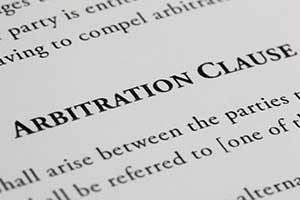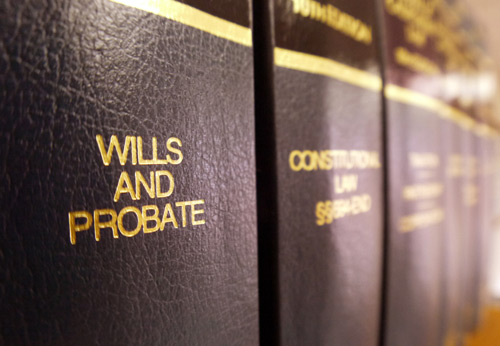While unfair and deceptive trade practice claims are sometimes alleged concurrently with breach of contract claims, a breach of contract alone does not constitute an unfair or deceptive trade practice. To prevail on both a breach of contract claim and an unfair and deceptive trade practice claim, North Carolina and federal courts require the breach to be accompanied by “substantial aggravating circumstances.” However, courts have provided little to no guidance on what amounts to substantial aggravating circumstances. A recent decision by the U.S. District Court for the Eastern District of North Carolina provides some insight.[1] Judge Flanagan indicated that, to be successful on both an…
-
-
North Carolina Business Court Reaffirms Breadth of Arbitrators’ Authority in Recent Decision
A recent decision by the North Carolina Business Court (NCBC) re-affirmed long standing precedent that an arbitration award is customarily final and binding, even if it includes an error of fact or law.[1] In the most recent case, Killian/Simonini, LLC argued the arbitrator exceeded his authority by impermissibly including consequential and punitive damages in his award, which were not provided for in the arbitration clause of their operating agreement. Killian/Simonini further argued the North Carolina Limited Liability Act controls and limits the remedy for failure to make capital contribution payments to a LLC to the actual amount of the payments.[2] Therefore, they contended the…
-
North Carolina Business Court Weights in on Attorneys’ Fees in Class Action Settlements
Recent decisions by the North Carolina Court of Appeals and North Carolina Business Court (NCBC) shed light on a previously unsettled question of law: when can a North Carolina trial court award attorney’s fees as part of a class-action settlement in the absence of additional statutory authority? Long-standing precedent is that a court can award attorneys’ fees to a prevailing party when statutorily authorized to do so.[1] This practice is known as the “American Rule.” The intended purpose of the American Rule is to encourage the conservation of judicial resources by promoting settlement and discouraging unnecessarily prolonged litigation.[2] Regarding…
-
North Carolina Business Court Awards Rule 11 Sanctions for Second Time this Fall
The North Carolina Business Court recently entered Rule 11 sanctions against attorneys who relied on inaccurate information from their clients in preparing and filing lawsuits. The decision comes just two months after the NCBC awarded Rule 11 sanctions in a case with similar facts (which we summarized Here). In the most recent decision, the client, John Mauney, represented to his attorneys that he was a manager and member of NC Bioremediation, LLC, and therefore had authority to file a lawsuit on the company’s behalf.[1] In fact, Mauney was not, nor had he ever been, a member or manager…
-
North Carolina Business Court Weighs in on Enforceability of Non-Compete and Confidentiality Agreements Post-Merger
It is well-settled law that adequate consideration is required to create binding restrictive covenants such as non-compete agreements. Generally, such agreements are entered at the start of an employment relationship, and the new employment itself constitutes consideration. In North Carolina, continued employment following a merger of two companies does not satisfy the consideration requirement. In a recent decision, the North Carolina Business Court (“NCBC”) confronted the very issue.[1] In January 2012, AmeriGas Propane, Inc., a propane company that services over two million residential and commercial customers nationwide, merged with Shaw L.P. Gas. Ermon Coffey, an employee of Shaw, and…
-
Estates of the Deceased “Wilmington Ten” Barred From Petitioning for Remuneration Payments for Wrongful Convictions
In 1971, amidst heated racial confrontations following court-ordered desegregation of public schools, Mike’s Grocery Store in Wilmington, North Carolina was firebombed. Police and fire rescue personnel responding to the scene were attacked by the perpetrators, and the event resulted in the arrest and conviction of nine black men and one white woman, collectively dubbed the “Wilmington Ten.” The incident received national attention and several articles were published in the late 1970’s on the trial and its aftermath. In 1980 the Fourth Circuit Court of Appeals overturned their convictions, determining that the defendants were denied their right to constitutional due process as a result of prosecutorial…
-
Caveat to a Caveat to a Will: North Carolina Court of Appeals Offers Non-Binding Opinion
In October the North Carolina Court of Appeals issued an unpublished opinion addressing the circumstances under which it is appropriate to grant a motion to dismiss in the context of a will caveat.[1] A caveat is a legal challenge to the probate of a will when there is confusion or disagreement as to the interpretation of the will. The three issues addressed were: (1) can a caveat challenge only a part of a will; (2) can an executor who presents a will for probate later file a caveat; and (3) can one who accepts a benefit under a will later challenge its validity via caveat?…
-
North Carolina Business Court Suggests a Willingness to Impose a Fiduciary Duty on Minority Shareholders
The North Carolina Business Court recently issued an opinion in which it suggested a willingness to adopt a position that “controlling” minority shareholders owe a fiduciary duty to their fellow minority shareholders.[1] The case arose out of a transaction between Reynolds American, Inc. (“Reynolds American”) and Lorillard, Inc. (“Lorillard”), funded in part by shares purchased by Reynolds American’s largest shareholder, British American Tobacco, p.l.c. (“British American”). Reynolds American was formed in 2004 when R.J. Reynolds Tobacco Company acquired British American’s United States subsidiary. British American obtained a forty-two percent (42%) stake in the newly formed Reynolds American. At that…
-
Eastern District of North Carolina Predicts the North Carolina Supreme Court Will Apply the Doctrine of Inevitable Disclosure “Under Certain Circumstances.”
The Eastern District of North Carolina recently decided a case affirming that, while North Carolina courts have not yet adopted the doctrine of inevitable disclosure, North Carolina would adopt the doctrine under certain circumstances.[1] Spirax Sarco, Inc., (“Spirax”), alleged a claim for, among other things, injunctive relief under the doctrine of inevitable disclosure against one of its former employees. Spirax purported that defendant Bryan Johnson (“Johnson”) used his company issued laptop to download thousands of confidential computer files to personal devices without permission. Johnson resigned from Spirax on May 27, 2014 to work for SSI Engineering, Inc. (“SSI…
-
Challenging the Validity of a Will vs. the Construction of a Will: North Carolina Court of Appeals Clarifies
Earlier in September the North Carolina Court of Appeals highlighted the procedural difference between challenging the validity of a will through a caveat proceeding and resolving questions as to the construction of a will through an action for declaratory judgment.[1] Plaintiff, Deborah Hildebran (“Hildebran”) was listed as the executrix of her father’s will (the “Will”). Upon her father’s death, the Will was probated in common form before the clerk and Hildebran was appointed executrix. The Will contained several handwritten markings, notably a line that struck through the name of the testator’s granddaughter Chanté Brittian…







